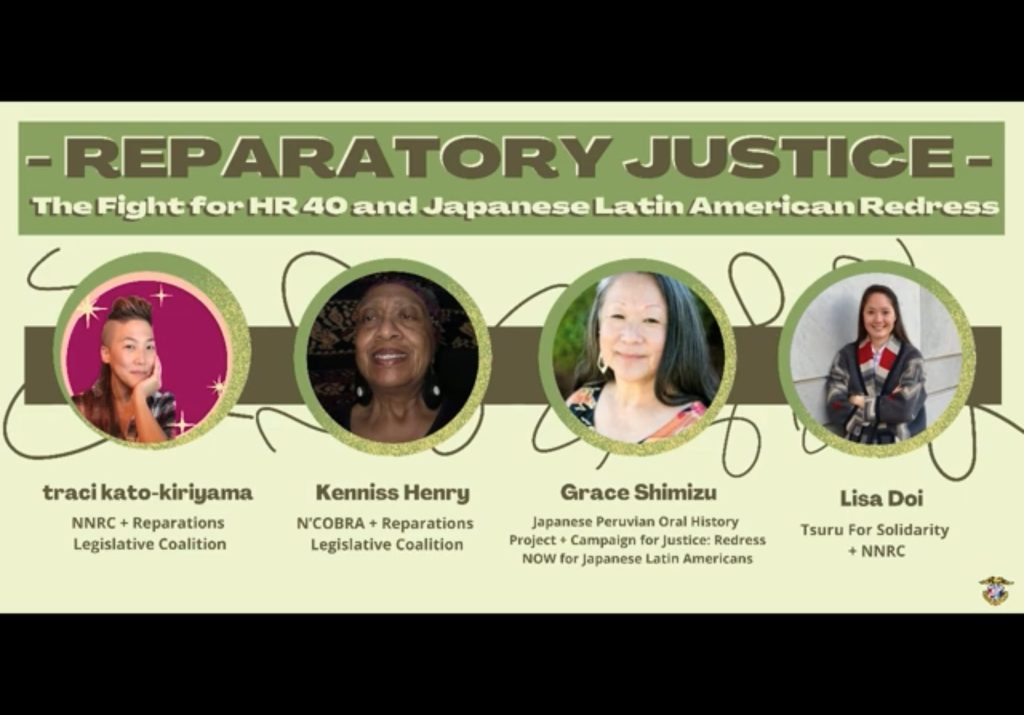Panel talks up reparations for African Americans and Japanese Latin Americans.
By P.C. Staff
Workshop Session 3’s title said it all: “Reparatory Justice: The Fight for HR 40 and Japanese Latin American Redress,” aptly encapsulating its topic.
The panel, held in August at the JACL National Convention in Las Vegas, discussed the history and status quo of decades-long efforts to obtain reparations for the descendants of people forcibly brought from Africa to become slaves beginning in the 17th century to what would become the United States of America, as well as people of Japanese ancestry from 13 Latin American countries (most from Peru) who, in the 20th century, were forcibly brought to the U.S. during World War II.

The JACL convention panel discussion was held in partnership with OCA-Asian Pacific American Advocates.
Moderated by Lisa Doi, president of the Chicago JACL chapter, on the panel comprised of Grace Shimizu, director of both the Japanese Peruvian Oral History Project and Campaign for Justice: Redress NOW for Japanese Latin Americans; Kenniss Henry, representing the National Coalition of Blacks for Reparations (N’COBRA) and the Reparations Legislative Coalition; and Traci Kato-Kiriyama, representing the National Nikkei Reparations Coalition and the Reparations Legislative Coalition.
Following introductions, the panel began with what Shimizu described as a “JLA (Japanese Latin American) 101” informational video, which conveyed how more than 2,000 Japanese emigrants to Latin American nations and their families were, after the outbreak of WWII, rounded up and shipped to the United States so they could be used in trade for Americans captured by Japan. (Most of the JLAs were detained at the internment camp in Crystal City, Texas.)
The video also focused on the late JLA redress advocate Art Shibayama, who died in July 2018, a couple years before the Organization of American States’ Inter-American Commission on Human Rights published its verdict in his favor in the case of Shibayama, et al. v. United States. (See “IACHR Verdict a Win for Latin American Nikkei,” Aug. 14, 2020, Pacific Citizen.)
The video ended with an appeal to sign a petition linked on its website to urge the Biden administration to comply with the Inter-American Commission on Human Rights’ verdict.
After the video’s conclusion, Shimizu, tying together the movements to pass HR 40, which aims to form a commission to study African American reparations and reparations for JLAs, said, “I’d like to focus on key points that I hope you will take away with you, the main one being the importance of struggles for reparatory justice, both the struggle to pass and implement HR 40 and the struggle for JLA reparations, especially at this historical juncture in the United States, where we the people of the U.S. are embroiled in the fight against racism, white supremacist authoritarianism and for a multiracial, multiethnic, gender-inclusive democracy.”
Up next was Henry, who relayed some of the history and evolution of N’COBRA’s push behind HR 40, which traces its roots to 1989. The goal of HR 40 is, in Henry’s words, to create a “commission to study reparations and to craft remedies for the violations that are identified.”
It’s a roadmap that was established by Sens. Spark Matsunaga and Daniel Inouye. In 1979, the two Hawaii Democrats introduced Senate Bill 1647 to establish a commission to study the WWII incarceration of Japanese Americans and Aleuts.
That bill was signed into law on July 31, 1980, by President Jimmy Carter, and it authorized the formation of the Commission on Wartime Internment and Relocation of Civilians, which was essential for the eventual passage of HR 442, the Civil Liberties Act of 1988, signed by President Ronald Reagan on Aug. 10, 1988.

The Aug. 15, 1980, Pacific Citizen reported that President Jimmy Carter on July 31, 1980, enacted S. 1647, which created the Commission on Wartime Relocation and Internment of Civilians. (Photo: Pacific Citizen Digital Archive)
The success of Japanese American redress resulted in an apology from the federal government and a $20,000 check to the approximately 60,000 still-living Japanese Americans who were affected by President Franklin D. Roosevelt’s Executive Order 9066, signed on Feb. 19, 1942.
“Reparations is more than a paycheck,” Henry said. “For me, reparations means that this country will finally acknowledge that they stole my ancestors, they sold my ancestors, and that they had my ancestors endure centuries of pernicious history and even today, the current day vestiges.”
Speaking later in the program, Henry added: “No amount of reparations can take away 400-plus years of atrocities.”
Speaking next was Kato-Kiriyama, who read an excerpt from her book, “Navigating With(out) Instruments.”
“Our Sansei generation had to find out who they were in order to move forward. And they uncovered history, and they unlocked a reckoning. We are not the moral authority on mass incarceration, mass removal or collective infliction of oppression onto one community,” Kato-Kiriyama read.
“We are linked to a larger cycle of struggle and also a legacy of resistance and solidarity. We have stood up to white supremacy time and again. Let our lessons learned from redress and reparations for Japanese Americans serve to remind us that we were once told it was impossible, that it would never happen, that it was part of what happens at a time of war, or that the camps were not even that bad, or it was necessary and good for us. … Let us not only support reparations because we once won a battle for redress, [but also] let us do it because it is the right thing to do.”
Later in the panel, Henry urged the audience to visit N’COBRA’s legacy website (ncobra.org) to study the history of HR 40, and its new website (officialncobraonline.org) to learn about its status quo.
She also urged people to call the White House’s comment line — (202) 456-1111 — to ask President Joe Biden to support HR 40 by issuing an executive order to “stand up” HR 40.
The video of the panel discussion can be viewed at youtube.com/watch?v=Cj3Q2nrjv5c.



